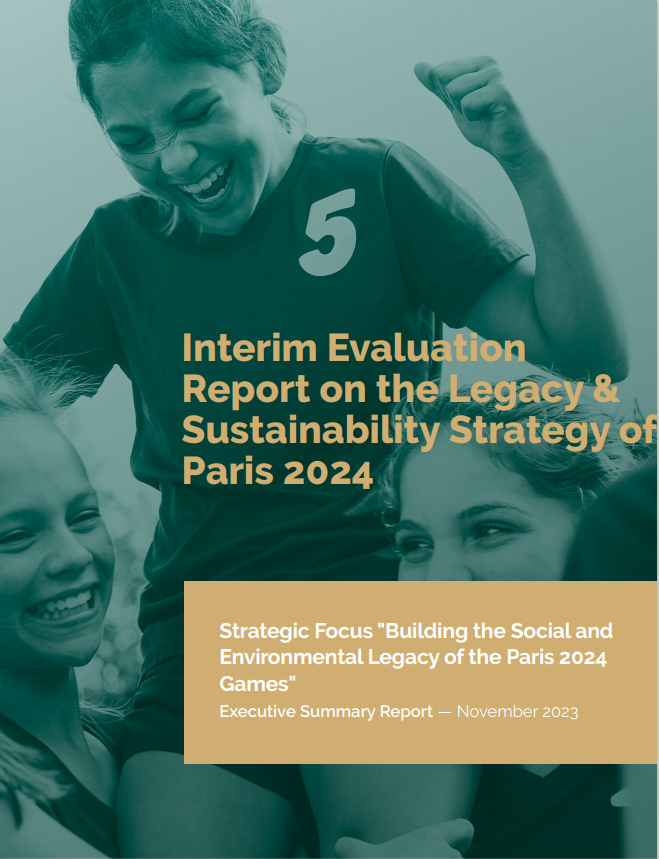To what extent are the Paris 2024 Olympic and Paralympic Games an opportunity to build a social and environmental legacy for France, its people and its territories? Six months ahead of the event, this report provides provisional answers and interim results.
Context of the report
This work was carried out as part of the overall evaluation process voluntarily implemented by the Paris 2024 Games Organising Committee.
It is first and foremost the result of several months of independent data collection and analysis by a group of evaluators composed of experts from the Centre de Droit et d’Économie du Sport (CDES), Pluricité, Agence Phare, Ipama and Sport 1.5.
The Paris 2024 Games Organising Committee also wished to place this evaluation under the supervision of an independent ‘Supervisory Evaluation Committee’ composed of French and international experts from a variety of backgrounds: members of the scientific community, representatives of the sports movement, governmental and professional organisations.
This interim report is the first stage in an evaluation process that will see two further reports produced one year (2025) and then five years (2029) after the Games. It should therefore be analysed in light of this timeframe and taken for what it is, i.e. an ‘ongoing’ (i.e. in itinere) evaluation report, and not a final report.
Scope of the report
It is also important to clarify the scope of the analysis: the “Legacy & Sustainability” strategy implemented by Paris 2024 and its stakeholders, and more specifically the second pillar of this strategy, which aims at “Building the Social and Environmental Legacy of the Paris 2024 Games”. The first pillar, which aims at “Delivering More Responsible Games”, will be analysed in another report to be published in the first half of 2024.
This report provides a broad description and analysis of the main initiatives undertaken by Paris 2024 and its stakeholders. It is not solely limited to the actions undertaken by Paris 2024, as the Legacy & Sustainability strategy is itself the result of a collective approach and constitutes the common framework of a shared ambition to ensure that the Games have a structuring impact on French society and its territories.
Two categories of evaluation indicators
The evaluation of the impacts produced by the Legacy & Sustainability strategy proposed in this report is based on two indicator dashboards:
- 17 indicators, including 4 priority indicators, determined by Paris 2024 and validated by the Supervisory Evaluation Committee.
- 20 indicators taken from the OECD’s methodological guides on “How to measure the impact of culture, sports and business events”. As these guides were published in July 2023, Paris 2024 is the first sports event organiser to incorporate this reference framework into its evaluation process.
Content of the report
The Interim Evaluation Report provides two levels of analysis.
Firstly, a thematic approach. It presents and analyses the major programmes and actions aimed at using sport for:
- Education
- Health
- Inclusion, equality and solidarity
- Ecological transition
The main programmes and actions analysed include the “Generation 2024” label and platform (education section), the “30 minutes of daily physical activity” programme in primary schools and the “1, 2, 3, Nagez !” programme (health section), the “Network of para-friendly clubs” programme and the “Impact 2024 – From the Stadium to Employment” action (inclusion, equality and solidarity section). As the ecological transition aspect is a different matter, the report deals more specifically with the intangible impact of Paris 2024’s ‘Environmental Excellence’ strategy, i.e., the way in which it helps to accelerate the ecological transformation of sport.
Secondly, a transversal approach where we find an analysis of the Paris 2024 Endowment Fund, but also of programmes that are intended to leave a legacy such as the “Terre de Jeux 2024” label. This cross-cutting approach also enables us to draw conclusions about the effectiveness, coherence and relevance of Paris 2024’s Legacy & Sustainability strategy as a whole and the actions that form part of it.
Finally, the report puts forward a list of five general recommendations with the aim of maintaining the efforts underway in order to implement the necessary conditions to generate a long-term structuring impact, enable a robust evaluation of the results and ensure the transmission and the future of the programmes beyond the Games.
To find out more:
Contact :
Christophe LEPETIT
Head of economic studies
lepetit@cdes.fr



